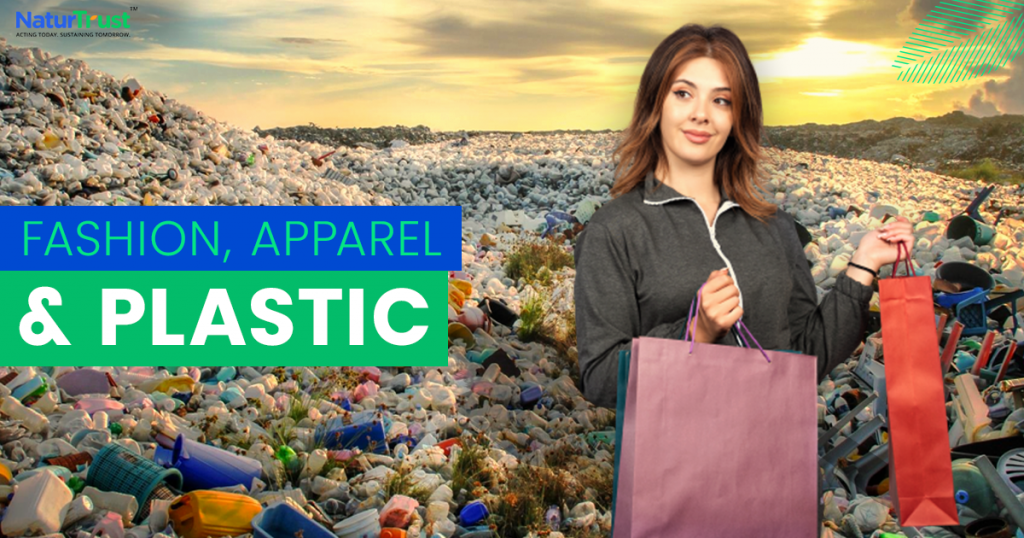The Rise Of Fashion Giants and Plastic Pollution

“Expected to churn out new collections and runway inspired trends every 15 days, apparel giants end up in a vicious cycle of sourcing cheap poly based raw materials for huge production quantities and opting for cheap single use packaging.”
While fashion has always been consumed conspicuously, the surge in it’s demand grew rather astronomically in the twenty-first century. Internet access and the invention of social media have led the apparel industry to become the giant mammoth it is today. Among the world’s many fashion houses, fast fashion brands like Zara and Asos have gained cult status and are accessed internationally by millions via their respective stores and e-shops.
Upon casting a closer look, it is evident that the growing demand for fashion products has also come with its share of problems which weigh heavily on the planet’s health. Expected to churn out new collections and runway inspired trends every 15 days while catering to an international demographic, these fashion giants end up in a vicious cycle of sourcing cheap poly based raw materials for huge production quantities, paying low wages in exchange of substantial amounts of labor and opting for cheap single use packaging, making the whole business operation unethical and unsustainable.
Fast Fashion Crisis
“Back in 2017, it came to light that microfibres were a direct result of using plastic infused materials for clothes.”
A recent report revealed that the apparel industry is creating over half a million tonnes of microfibre waste each year, to which plastic waste is a substantial contributor. Back in 2017, it came to light that microfibres were a direct result of using plastic infused materials for clothes, which were enabling brands to produce trendy items much quicker at a considerably lower price. Though other sectors like HORECA and FMCG face the landfill scarcity problem, they pale in comparison to the magnitude of crisis being faced by the apparel industry when it comes to disposal of fast fashion clothing that remains unsold or barely worn by customers due to quickly changing trends.
Overwhelming Dependence on Plastic
“Apparel brands are heavily dependent on plastic packaging throughout it’s supply chain. From factory storage units using poly bags to the logistics departments catering to heavy influx of online orders.”
However there are more ways than one in which fashion is adding to the world’s plastic problem. Fashion is heavily dependent on plastic packaging throughout it’s supply chain. From factory storage units using poly bags to the logistics departments catering to heavy influx of online orders, each wrapped individually to endure not just local but international shipping regimes. Fashion brands thus far have viewed cheap but creative plastic packaging as an extension of their identity and a means to amplify their persona.
Slow Fashion – A ‘Green’ Awakening
“ Slow fashion prioritises conscious rather than conspicuous consumption, usage of natural materials rather than poly based fibres and upcycled or bio based packaging instead of single use plastic packaging.”
For several years now, a parallel fashion movement has been in the making. The concept of slow fashion or ethical fashion manifested to curb some of the problems that came along with fast fashion. Acting on the opposite end of the spectrum, slow fashion prioritises conscious rather than conspicuous consumption, fair wages and working conditions for artisans, preservation of dying crafts over trends, usage of natural materials rather than poly based fibres and upcycled or bio based packaging instead of single use plastic packaging.
“Overtime, the principles of slow fashion are taking precedence over fast fashion trends and brands are embracing biobased or bioplastics over single use plastic packaging.”
Preservation of the ecosystem and keeping it free of plastic waste is an important pillar of the slow fashion movement. Established brands like Stella McCartney have been one of the front runners in embracing this cause as they pledged to upcycle recovered ocean plastic into their brand’s future fashion lines, starting 2017. Levis Jeans also acted on the agency to save the planet by introducing denim made with upcycled plastic bottles.
Today, few fashion brands are making an easy and much needed switch from traditional plastic packaging to bioplastic packaging, saving the environment from microplastics and toxin leakage which inevitably results when traditional plastics start breaking down. Overtime, the principles of slow fashion are taking precedence over fast fashion trends and brands are becoming habitual to meeting new standards being set by their stakeholders and customers.





Comments are closed.